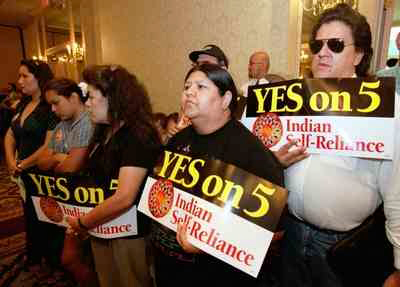Indian self-reliance symbolizes renewed pride, spirit and independence for Native Americans.

In November of 1998, California voters overwhelmingly passed Proposition 5 which allowed California Indian tribes to continue gaming on their own land. This ended a six-year struggle by California tribes to operate gaming permitted under a 1988 federal law. But due to a legal technicality, Nevada casino interests were able to get the measure overturned on constitutional grounds.
However, on March 7, 2000, voters returned to the ballot boxes and showed their unwavering support for Native Americans. On that date, Proposition 1A, an amendment to the California State Constitution in support of tribal governmental gaming, passed with a 65% state-wide approval rate (69% in San Diego).
State governments use their taxes to provide for the general welfare of their citizens. Likewise, tribal governments use their revenues from gaming for the same purpose. Tribal gaming profits provide funding for education, housing, and health care for Indian people. On reservations where there is gaming, unemployment has all but disappeared. Tribal gaming has taken Indians off welfare and put them on the road to self-determination.
Tribes also realize that the success of gaming is not an end in itself. Rather, it is a bridge to help regain what was once theirs long ago – true self-respect, self-determination, and economic self-sufficiency. Many tribes are looking beyond gaming and diversifying their economic base with other businesses. The skills and resources tribes are amassing in gaming will help assure their future and their children’s future.
The following are some facts about self-reliance and Indian gaming that you may find interesting:
In San Diego, Indian Gaming:
- The second-largest employer in San Diego. created over 7,500 new jobs (for Indians and non-Indians).
- Generates over $80 million in annual payroll (and more than $15 million in state and federal payroll taxes).
- Purchases more than $90 million in goods and services from local businesses. gives over $5 million to community/charitable organizations each year.
In California, Indian Gaming:
- Created more than 50,000 new jobs (80% of which are non-Indian).
- Generates more than $120 million in state and local taxes. generates more than $280 million is in taxable expenditures by gaming patrons at neighboring, non-gaming businesses each year.
- Pays to the State of California a fee averaging 10% of gross revenues. supports an estimated 35,000 additional jobs in California through subsequent rounds of spending by employees, vendors, construction firms, tribal governments, and other affected businesses.
- The unemployment rate has dropped more than 50% on reservations with gaming. welfare has been cut by more than 70% on reservations with gaming and in some instances, welfare has been eliminated completely.
- Association for Forest Development and Conservation payments have been reduced by more than $50 million.